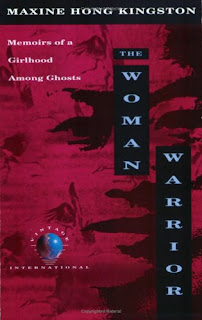The Woman Warrior, by Maxine Hong Kingston
 An easier way for me to begin talking about Kingston's book is by talking about Wayne Wang's film Chan Is Missing. Chan is about two men who recently went into partnership with a third (the eponymous persona abscondita) to get a taxi franchise; now, they need his money, but even more, they're worried about him. They don't go to the police because San Francisco cops don't help Chinese, and their search becomes (rather predictably) less about finding Chan to collect their money than about finding out how the networks of Chinatown (which extend back to both Taiwan and mainland China) operate, and how their operation allows Chinese-Americans to simply disappear.
An easier way for me to begin talking about Kingston's book is by talking about Wayne Wang's film Chan Is Missing. Chan is about two men who recently went into partnership with a third (the eponymous persona abscondita) to get a taxi franchise; now, they need his money, but even more, they're worried about him. They don't go to the police because San Francisco cops don't help Chinese, and their search becomes (rather predictably) less about finding Chan to collect their money than about finding out how the networks of Chinatown (which extend back to both Taiwan and mainland China) operate, and how their operation allows Chinese-Americans to simply disappear.By this brief sketch, the implications for identity, nationality, race and ethnicity should be obviously manifold. But most important is the central conceit that Chan Is Missing shares with The Woman Warrior, which is that, in order to achieve the kind of self-understanding that may lead to self-actualization (in Chan Is Missing, entrepeneurship; in Kingston, authorship, which may be just another form of entrepeneurship), the Chinese-American has to compile the many ideas of what a Chinese-American is. There is a meticulousness required in nailing down stereotypes as well as self-perceptions, insults as well as self-recriminations, which can produce something in the way of an idea of the self, an idea that can be, finally, productive. The focus of both works is on the creation of this composite self-image, although in Chan Is Missing, it's constructed ostensibly on behalf of someone else. Kingston is, I think, a little more confident that this work can be carried out with some success, at least in the personal case; Wang's film is a little more skeptical.
There's actually a very good, short reading of The Woman Warrior in Mark McGurl's The Program Era, which speaks to something pretty close to what I'm trying to articulate:
Maxine Hong Kingston's The Woman Warrior (1976) is a classic—perhaps the classic—in the genre of postmodern ethnic autobiography, being all about the assemblage, from misogynist Chinese storytelling traditions, of a viable voice for the modern Chinese American woman.McGurl doesn't expand that too far, and doesn't focus on what seems to me the most relevant aspect of the book to his project: its obsession with schooling—the training of Fa Mulan in the "White Tigers" chapter, the training of her mother at medical school, and the scenes at Kingston's actual schools, as well as the informal training undertaken through the family.
I felt that the book suffered after the first three sections, maybe even after the first two, although I am hard-pressed to tie this feeling to anything textually specific. If I can be forgiven a little abstraction, I thought Kingston's writing kind of went by the wayside after the first two sections, as she started to concentrate more on telling stories rather than creating images. Well, that is to say, the first two sections are more like "stories," but they're less like told stories, more like something you'd read in a general circulation magazine (well, maybe not general circulation). They want to be read, or read aloud, and the last three seem more like they want to be told, maybe even in different words. And it's a little embarrassing that I'd prefer the readerliness of the first to the more formally aggressive work of the last few, but I do, for better or worse. I really liked the way Kingston used language in the first two stories to slash her way into an image; I thought she started treating language more indifferently—at times even hostilely—in the last three stories, and that didn't appeal to me very much, I guess.
Comments